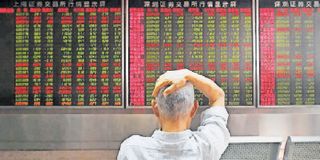Mediation best way to avert global trade war

What you need to know:
- A trade war is an economic conflict between two countries in which one uses tariffs and other technical barriers to trade in a punitive and protectionist manner.
Two nations that are arguably the world’s largest that is, the United States (US) and China are on the brink of a trade war that could affect global commerce.
A trade war is an economic conflict between two countries in which one uses tariffs and other technical barriers to trade in a punitive and protectionist manner.
A trade war would make imports from the affected country very expensive and in effect may cause a weakening of the affected state’s economy especially if it largely depends on global trade.
Trade wars have been used a lot historically by many nations especially the US. In 1930 for example, a tariff bill was passed by the US leading to retaliatory measures by about 30 countries. Trade wars were an indirect cause of the great recession and contributed to a lot of global conflicts.
In fact it is said that World War II was a result of global trade wars. Trade wars are clearly a dangerous and undesired event. They do not just occur, they arise out of one country’s policies amongst other things.
The looming trade war between the US and China is due to allegations by the former of unfair trade practises including alleged intellectual property theft and discriminatory trade practises by Beijing.
The so called discriminatory trade practises centre on China’s alleged discrimination against foreign businesses through the use of protectionist measures. It is alleged that China favours its domestic business and is unfair to foreigners.
In fact there are a lot of scholarly articles and studies on China’s alleged World Trade Organisation (WTO) violations. One scholarly article decried China’s protectionist laws as being against WTO principles.
Another cause is the desire by the US to protect its domestic steel industry. Protectionist steps by the government have happened before in the past and have been the subject of WTO panel decisions such as DS436 and DS184.
A protectionist tariff would enable a country protect its domestic industries against dumping by making imports from a competing state more expensive than the products and services available in the domestic industry.
A trade war between the US and China would affect the global economy slowing down trade by up to three per cent. A trade war is very drastic and is undesired especially when there are WTO and GATT (General Agreement on Tariffs and Trade) provisions for softer redresses on the matter.
The general spirit of WTO and GATT is liberalisation of trade, whereby technical barriers such as high tariffs are frowned upon, though not prohibited when a country seeks to protect its domestic industry from dumping. US threats of protectionism are therefore not quite contrary to WTO and GATT. I am not privy to the facts about China’s alleged unfair trade practises. However, if true they would be against WTO and GATT. The US has already announced plans to sue China at the WTO.
Given the escalating situation it would be ideal for the WTO to intervene as it has a defined dispute resolution mechanism that may be adjudicative or reconciliatory. The latter is the preferred means of settling the dispute. The WTO has diverse remedies including allowing for retaliation where one country doesn’t adhere to WTO findings.
I hope for a sober, speedy and conciliatory resolution of the dispute, which in any event can be prevented at this stage through negotiations and mediation.
Ms Mputhia is the founder of C Mputhia Advocates. Email: [email protected].




